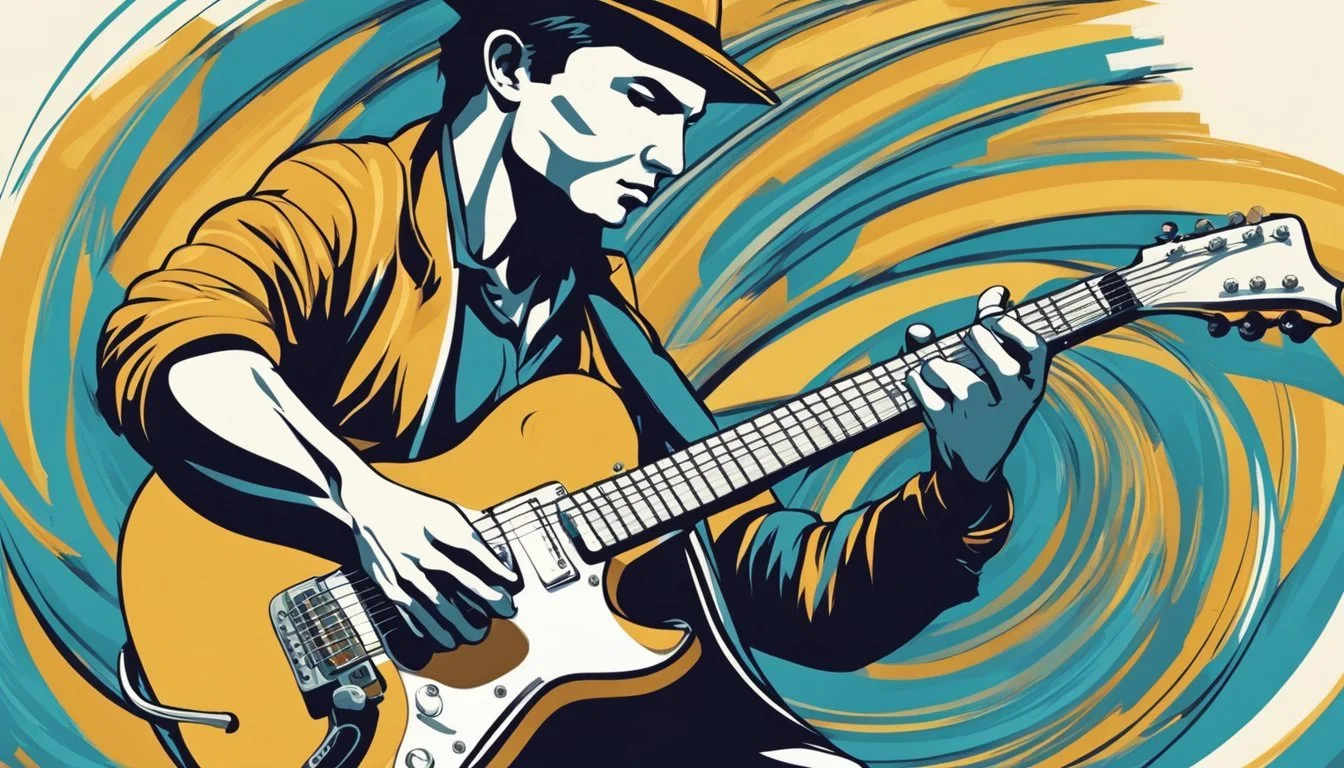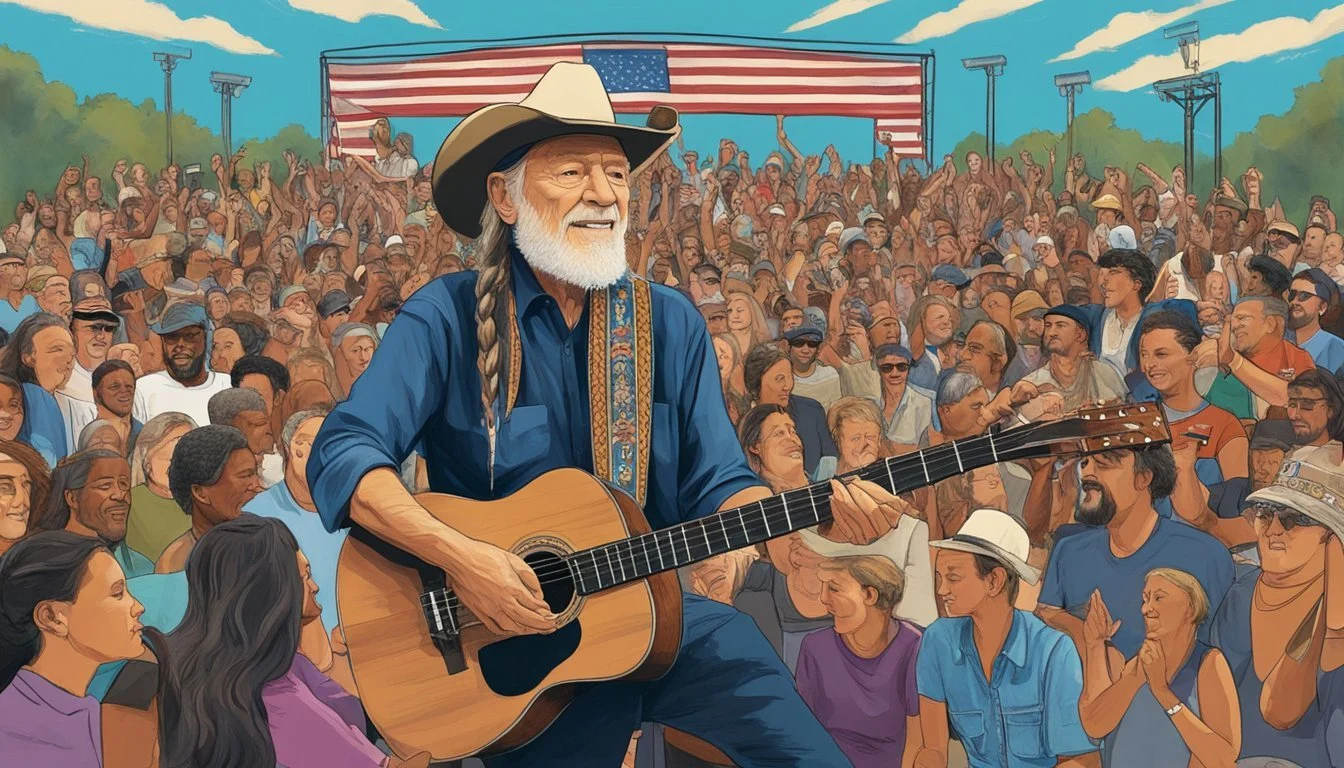Willie Nelson Documentary Challenges Country Music Conventions
Redefining Country Music's Image
The documentary series "Willie Nelson & Family" offers viewers an intimate look into the life and career of the legendary country music icon. Released in 2023 on Paramount+, this four-part series explores Willie Nelson's journey through the music industry, his personal relationships, and his impact on American culture.
"Willie Nelson & Family" challenges common assumptions about country music and its artists by showcasing diverse perspectives and untold stories. Through rare footage and exclusive interviews, the documentary reveals aspects of Nelson's life that may surprise even his most dedicated fans. From his groundbreaking musical collaborations to his unconventional personal choices, the series paints a nuanced portrait of a man who has consistently defied expectations throughout his career.
1) Red Headed Stranger
Willie Nelson's 1975 album "Red Headed Stranger" defied country music norms. The concept album told a story of love, loss, and redemption through sparse arrangements and Nelson's emotive vocals.
Columbia Records initially resisted the album's stripped-down sound. They worried it lacked commercial appeal. Nelson stood firm, insisting on creative control.
The gamble paid off. "Red Headed Stranger" became a critical and commercial success. It reached number one on the Billboard Top Country Albums chart.
The album's hit single "Blue Eyes Crying in the Rain" topped the country charts. It also crossed over to pop audiences, expanding Nelson's fan base.
"Red Headed Stranger" helped establish Nelson as a leading figure in the outlaw country movement. Its success proved that country music could be both artistically ambitious and commercially viable.
The album's impact extends beyond its initial release. It continues to influence musicians across genres. Many consider it one of the greatest concept albums in country music history.
2) On The Road Again
"On The Road Again" became an iconic anthem that defied expectations for country music. Released in 1980, the song crossed genre boundaries and resonated with audiences far beyond traditional country fans.
Willie Nelson & Family's hit challenged the notion that country music was limited to rural themes. Instead, it celebrated the nomadic lifestyle of touring musicians, appealing to a broader audience.
The song's upbeat tempo and catchy melody contrasted with the often melancholic reputation of country music. It showcased the band's versatility and willingness to experiment with different musical styles.
"On The Road Again" also broke stereotypes by achieving mainstream success. It reached number one on the Billboard Hot Country Singles chart and crossed over to the pop charts, peaking at number 20 on the Billboard Hot 100.
The track's enduring popularity has led to its use in various media, including films and commercials. This widespread exposure further challenged preconceptions about country music's appeal and marketability.
Through "On The Road Again," Willie Nelson & Family demonstrated that country artists could create universally relatable music that transcends genre limitations and cultural boundaries.
3) Outlaw Country Movement
The "Willie Nelson & Family" docuseries explores Willie Nelson's pivotal role in shaping the outlaw country movement. This subgenre emerged in the mid-1970s as a rebellion against the polished Nashville sound.
Willie Nelson, along with artists like Waylon Jennings and Kris Kristofferson, spearheaded this movement. They rejected the conventional production style and sought creative control over their music.
Nelson's transition to outlaw country marked a significant shift in his career. He embraced a rawer, more authentic sound that resonated with audiences seeking something different from mainstream country.
The docuseries highlights how Nelson's iconic albums like "Red Headed Stranger" and "Stardust" exemplified the outlaw country ethos. These records showcased his unique style and storytelling abilities.
Nelson's involvement in the outlaw movement extended beyond music. He cultivated an image that challenged traditional country norms, from his long hair to his well-known affinity for marijuana.
Through interviews and archival footage, the series illustrates how Nelson's contributions to outlaw country influenced the broader landscape of American music. It showcases his enduring impact on artists across multiple genres.
4) Farm Aid
Willie Nelson co-founded Farm Aid in 1985, challenging the notion that musicians couldn't make a difference in social issues. The benefit concert series has raised over $70 million to support family farmers and promote sustainable agriculture.
Farm Aid broke stereotypes by uniting diverse musical genres for a common cause. Country, rock, and folk artists came together, demonstrating that music could transcend boundaries to address rural concerns.
The organization's advocacy work defied expectations of celebrity involvement in politics. Nelson and fellow board members actively lobbied for pro-farmer legislation and policies, proving musicians could be effective agents of change.
Farm Aid's commitment to supporting local and organic farming practices challenged industrial agriculture norms. By promoting alternative methods, the organization helped shift public perception of food production.
The annual concert's enduring success for over three decades countered skepticism about the longevity of celebrity-driven charitable efforts. Farm Aid's consistent impact demonstrates the power of sustained activism in the entertainment industry.
5) Trigger (his guitar)
Willie Nelson's iconic guitar, Trigger, has been an inseparable part of his musical journey for over five decades. This Martin N-20 classical guitar has become a symbol of Nelson's enduring career and unique sound.
Trigger's worn appearance, with a large hole in its body, reflects Nelson's countless performances and recording sessions. Despite its battered state, the guitar continues to produce the distinctive tone that has defined Nelson's music.
The documentary "Willie Nelson & Family" offers viewers insight into Trigger's significance. It showcases footage of Nelson playing his beloved instrument, highlighting the deep connection between the artist and his guitar.
Nelson's dedication to Trigger challenges the notion that musicians need multiple high-end instruments. He has consistently chosen to perform with this single guitar, demonstrating that true artistry lies in the musician's skill and relationship with their instrument.
Trigger's story serves as a testament to Nelson's authenticity and commitment to his craft. The guitar's longevity mirrors Nelson's own resilience in the music industry, breaking stereotypes about disposable instruments and fleeting fame.
6) Luck Ranch
Willie Nelson's Luck Ranch in Spicewood, Texas, defies expectations for a country music icon's property. The 700-acre ranch serves as more than just a home - it's a vibrant hub for music and community.
Each year, Luck Ranch hosts the Luck Reunion, a music festival that brings together established and emerging artists. The event showcases a diverse range of talent, breaking away from traditional country music stereotypes.
In 2024, the Luck Reunion featured an eclectic lineup including Willie Nelson & Family, Tyler Childers, Dawes & Lucius, and Old Crow Medicine Show. This mix of performers demonstrates Nelson's commitment to supporting various musical styles.
The ranch itself is designed to resemble an old Western town, complete with a chapel, saloon, and jail. This unique setting provides an immersive experience for festival-goers, blending history with contemporary music.
By opening his private property for public events, Nelson challenges the notion of the reclusive country star. Luck Ranch has become a symbol of inclusivity and innovation in the music industry.
7) The Highwaymen
The Highwaymen supergroup challenged country music norms by bringing together four legendary artists: Willie Nelson, Johnny Cash, Waylon Jennings, and Kris Kristofferson. This collaboration defied the notion that established stars couldn't work together successfully.
Formed in 1985, The Highwaymen united distinct musical styles and personalities. Their partnership demonstrated that country artists could transcend individual fame to create something greater than the sum of its parts.
The group's success proved that older musicians could remain relevant and commercially viable. They recorded three studio albums and embarked on multiple tours, appealing to both longtime fans and new audiences.
The Highwaymen's music blended traditional country with elements of rock and folk. This fusion helped bridge generational gaps and expand country music's reach beyond its typical boundaries.
Their performances showcased each member's unique talents while fostering a sense of camaraderie. This dynamic contradicted stereotypes about competition and ego in the music industry.
The Highwaymen's legacy continues to inspire collaborations in country music. Their impact extends beyond their recordings, influencing how artists approach teamwork and creativity in the genre.
The Musical Evolution of Willie Nelson & Family
Willie Nelson and his family band have continually pushed musical boundaries over their decades-long career. Their journey spans multiple genres and features groundbreaking collaborations that have shaped the landscape of American music.
Breaking Genre Barriers
Willie Nelson's musical style defies easy categorization. He began as a Nashville songwriter in the 1960s, penning hits for other artists. In the 1970s, Nelson helped pioneer the outlaw country movement, rejecting the polished Nashville sound for a grittier, more authentic approach.
His 1978 album "Stardust" saw Nelson tackling pop standards, showcasing his versatility. This bold move expanded his audience and influenced future cross-genre experiments in country music.
Nelson's guitar playing, inspired by jazz legend Django Reinhardt, added unique flavor to his sound. This unexpected influence helped set him apart from other country artists.
Innovative Collaborations
Willie Nelson & Family have consistently sought out diverse musical partnerships. Their collaborations span generations and genres, keeping their sound fresh and relevant.
Nelson's duets with Waylon Jennings in the 1970s defined the outlaw country era. Later partnerships with artists like Snoop Dogg and Norah Jones demonstrated Nelson's ability to bridge musical divides.
The family band itself represents a unique collaborative approach. Willie's sister Bobbie on piano and sons Lukas and Micah on guitar have been integral to the group's evolving sound.
These musical alliances have allowed Willie Nelson & Family to continually reinvent themselves, ensuring their enduring impact on American music.
Cultural Impact and Influence
Willie Nelson's influence extends far beyond music, challenging societal expectations and advocating for important causes. His outspoken nature and unconventional lifestyle have left an indelible mark on American culture.
Challenging Social Norms
Willie Nelson's unique style and persona have consistently defied country music stereotypes. His long braids and casual attire stood in stark contrast to the polished image of many Nashville stars. This visual rebellion represented a broader challenge to conservative country norms.
Nelson's openness about marijuana use further pushed boundaries. He transformed from an outlaw figure to a respected elder statesman, helping shift public perception of cannabis.
His music blended genres, incorporating elements of jazz, rock, and folk. This cross-pollination expanded country music's audience and influenced countless artists across genres.
Advocacy and Activism
Nelson's activism has been a cornerstone of his legacy. He co-founded Farm Aid in 1985, raising awareness and funds for struggling family farmers. The annual concert series continues to spotlight agricultural issues and support rural communities.
His environmental advocacy includes promoting biodiesel fuel and sustainable farming practices. Nelson has used his platform to speak out on climate change and renewable energy.
He's been a vocal supporter of LGBTQ+ rights, challenging country music's traditionally conservative stance. Nelson's inclusive message and collaborations with diverse artists have helped broaden the genre's appeal.





